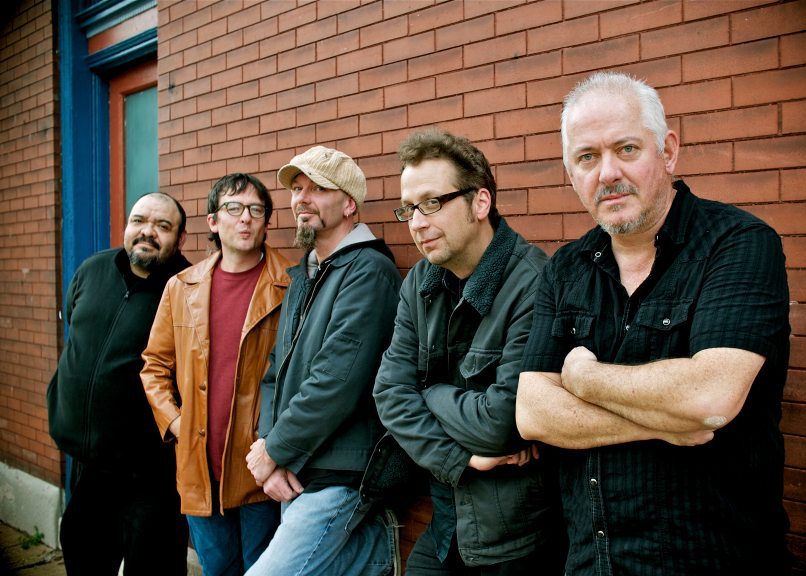
If Grammys were given for time management, Jon Langford would be the Quincy Jones of said accomplishment.

Not only is the transplanted Chicagoan currently on the road with his y’alternative band The Waco Brothers, but he’s a founding member of storied punk outfit the Mekons, gets together with other local musicians in the Men of Gwent when he goes home to Wales, has a thriving solo career, comes up with material for his other alt-country project the Pine Valley Cosmonauts, and still somehow had the audacity to launch Bad Luck Jonathan, a band that specializes in “socialist voodoo space boogie.” And this doesn’t even take into account Langford’s work as a prolific and respected visual artist who has enjoyed numerous gallery shows and found his creations appearing on bottles and other items sold by the Dogfish Head Brewery. It’s a balancing act he’s gotten used to and managed to creatively compartmentalize over time.

“With the Mekons, everyone is scattered all over the place, so we just work in blocks. Or when we can do something like a festival or a gig with a bit of money, then we can pay to get people somewhere and then we work out a couple of weeks of work,” he explained from his home in Chicago. “But with writing, I would say The Waco Brothers is very specific. There are themes and a kind of approach—I know when I’m writing something for The Waco Brothers. For the Mekons, we don’t really write until we get together and everything else goes in the solo bag (laughs). But I tend to write in blocks as well. I won’t write a song for months, and then I sit down and start writing when I have time to do that. It’s a bit of a balancing act between my painting and writing as well.”
Currently in Wacos mode, Langford is fully enjoying hitting the road in support of their 10th studio album, Going Down in History. In addition to having to record this project on the fly due to the fact that founding member Dean Schlabowske now calls Austin, TX home, this is also the first outing not to feature longtime drummer Steve Goulding.
 “With the Wacos album, we didn’t even discuss the material particularly. We just kind of wanted it to showcase the sound of the band in the way the band had changed with Joe Camarillo coming on full-time as the drummer,” Langford explained. That rhythm section was so explosive—we just wanted to have material where we’d have a lot of freedom. We were thinking about songs without complicated arrangements or chord structures. We wanted to strip it down in terms of what the structure of the songs was. We’d be in the studio and I’d ask Dean what he had, and he’d start playing a song and we’d start in and join along with him. By the time we’d got through it three or four times, we’d exhausted ourselves good and thought we’d leave it at that.”
“With the Wacos album, we didn’t even discuss the material particularly. We just kind of wanted it to showcase the sound of the band in the way the band had changed with Joe Camarillo coming on full-time as the drummer,” Langford explained. That rhythm section was so explosive—we just wanted to have material where we’d have a lot of freedom. We were thinking about songs without complicated arrangements or chord structures. We wanted to strip it down in terms of what the structure of the songs was. We’d be in the studio and I’d ask Dean what he had, and he’d start playing a song and we’d start in and join along with him. By the time we’d got through it three or four times, we’d exhausted ourselves good and thought we’d leave it at that.”

The results are 10 songs that defiantly straddle the crossroads of country music and punk rock. And while the departure of steel guitarist Mark Durante a few years ago has removed the overt nuances of the former genre, Langford and his crew manage to infuse plenty of roots-rock swagger in a mix of originals and tow covers—a soaring reading of the Small Faces’ “All or Nothing” dedicated to that band’s late keyboardist and Wacos buddy Ian McLagan, and the closing number, a fiddle-fueled romp through Austin-based singer-songwriter Jon Dee Graham’s “Orphan Song.”
As for Langford’s love of classic country, it dates back to the early 1980s when the Mekons was his sole focus and a buddy from the United States came over to the U.K. on a visit and made comparisons between what the Welsh singer-songwriter’s band was doing and that most American of genres.
“A friend of ours from Chicago came over to England and made comparisons between the Mekons and country music, which we didn’t think we liked country music and then we discovered we did,” he recalled with a laugh.
 By the early 1990s, a flirtation with major label imprint A&M resulted in 1989’s The Mekons Rock ‘N’ Roll and found Langford landing in Chicago, a place that always appealed to him. It just so happened at a time when the city was experiencing a musical Renaissance that included a burgeoning alternative country scene and the emerging of indie imprint Bloodshoot Records, whose owners immediately sought Langford out when they found out he was planting roots in the Second City.
By the early 1990s, a flirtation with major label imprint A&M resulted in 1989’s The Mekons Rock ‘N’ Roll and found Langford landing in Chicago, a place that always appealed to him. It just so happened at a time when the city was experiencing a musical Renaissance that included a burgeoning alternative country scene and the emerging of indie imprint Bloodshoot Records, whose owners immediately sought Langford out when they found out he was planting roots in the Second City.
“I didn’t know that was going on, but there were a lot of people moving there at that time. It was just a happy coincidence for me that the people at Bloodshot were big Mekons fans,” Langford explained.
“I moved to town, and they approached me immediately and asked if I would be interested in doing something. The Mekons had kind of gone past the Beer & Whiskey phase and were, in fact, on a state of collapse having been on a major label at A&M and done a rock and roll album, which wasn’t country. [Recording that kind of music was] still something that nagged at me that I was interested in and the idea of being able to perform those songs. Once we got the Waco Brothers going, it quickly became a really exciting, kind of unpretentious Friday night rock band. There are a lot of people I’ve met over the years who have sneered at that kind of that concept. I always thought British punk rock was good, and a good bar band is a kind of difficult thing to pull off. It beats staring at your shoes, being experimental and using lots of pedals,” he said with a laugh.


























